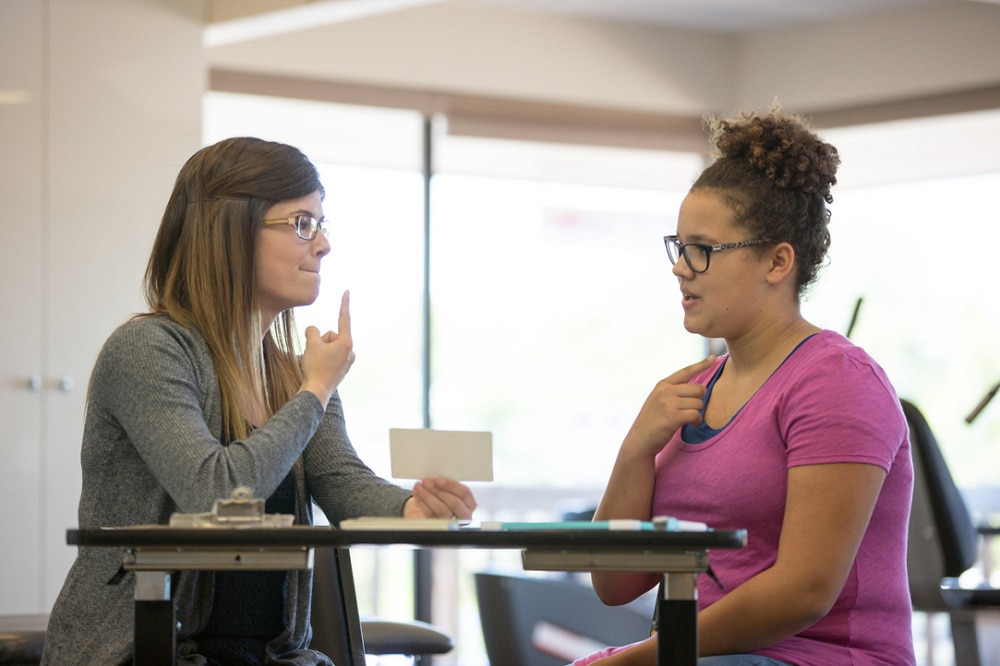Speech Therapy
At Park Rehab, our licensed speech-language pathologists (SLPs) provide personalized, one-on-one care to help you overcome communication or swallowing difficulties and feel like yourself again.
We will make it possible for you to communicate freely again!


Struggling to speak clearly, express your thoughts, or swallow comfortably can be frustrating and isolating. Whether you’re dealing with the effects of a neurological condition, an injury, or a speech disorder developed later in life, speech therapy can help you regain the confidence and ability to communicate with clarity and purpose.
At Park Rehab, our licensed speech-language pathologists (SLPs) provide personalized, one-on-one care to help you overcome communication or swallowing difficulties and feel like yourself again.
We will make it possible for you to communicate freely again!
What Is A Speech Disorder And Can Therapy Really Help?
Yes – speech therapy has helped thousands of adults reclaim their ability to speak, eat, and engage in everyday life. Adult speech and communication disorders can develop for many reasons, including:
- Neurological conditions such as stroke, Parkinson’s disease, or multiple sclerosis
- Brain injuries or trauma
- Progressive disorders like ALS
- Muscle weakness, coordination issues, or structural changes
These challenges may lead to difficulties such as:
- Stuttering or disfluency
- Slurred or slow speech (dysarthria)
- Trouble finding the right words
- Difficulty chewing or swallowing (dysphagia)
- Trouble understanding or processing language
But don’t despair! These symptoms can often be improved with expert care. Our speech therapists create a tailored plan using evidence-based techniques to address your unique needs and goals.
How Can Speech Therapy Help Me?
Speech-language pathologists (SLPs) are trained professionals who work with a wide range of conditions that affect communication, voice, language comprehension, cognition, and swallowing.
Your treatment may include:
- Targeted speech exercises to improve clarity, volume, and articulation
- Voice therapy to address pitch, tone, or vocal strain
- Swallowing and oral motor training to improve eating and drinking safety
- Cognitive-linguistic therapy to boost memory, focus, and word-recall
- Compensatory strategies to improve communication in daily life
At Park Rehab, we use a combination of neurological, physical, and behavioral therapies to address underlying issues while building practical skills that enhance your daily communication and confidence.
Do I Need Speech Therapy ?
It’s not always obvious when to seek speech therapy – especially as symptoms may develop slowly or vary in severity. But if you or a loved one are experiencing any of the following, it’s worth scheduling an evaluation:
- Frequent difficulty finding or expressing words
- Challenges with understanding written or spoken language
- Noticeable changes in voice quality (hoarseness, pitch changes, weak voice)
- Difficulty with chewing, swallowing, or coughing when eating/drinking
- Trouble following conversations or staying focused
- A sense of frustration, embarrassment, or withdrawal from social interaction
Early intervention leads to better outcomes. Our speech therapists are trained to identify even subtle signs and create a plan to support your recovery and goals.
What To Expect At Park Rehab ?
We understand that speech issues can feel deeply personal. That’s why we provide a safe, private, and judgment-free environment for every client. When you visit Park Rehab for speech therapy, you can expect:
- A comprehensive assessment of your speech, cognition, and/or swallowing abilities
- A customized treatment plan designed to match your pace and priorities
- One-on-one therapy sessions focused on progress and empowerment
- Ongoing support, tracking, and modifications based on your improvement
- Encouraging guidance to help you reclaim your independence and self-expression
Whether you’re recovering from a stroke, managing a neurological condition, or simply want to communicate more clearly, you’ll be met with compassion and expertise every step of the way
on:
- Frequent difficulty finding or expressing words
- Challenges with understanding written or spoken language
- Noticeable changes in voice quality (hoarseness, pitch changes, weak voice)
- Difficulty with chewing, swallowing, or coughing when eating/drinking
- Trouble following conversations or staying focused
- A sense of frustration, embarrassment, or withdrawal from social interaction
Early intervention leads to better outcomes. Our speech therapists are trained to identify even subtle signs and create a plan to support your recovery and goals.
